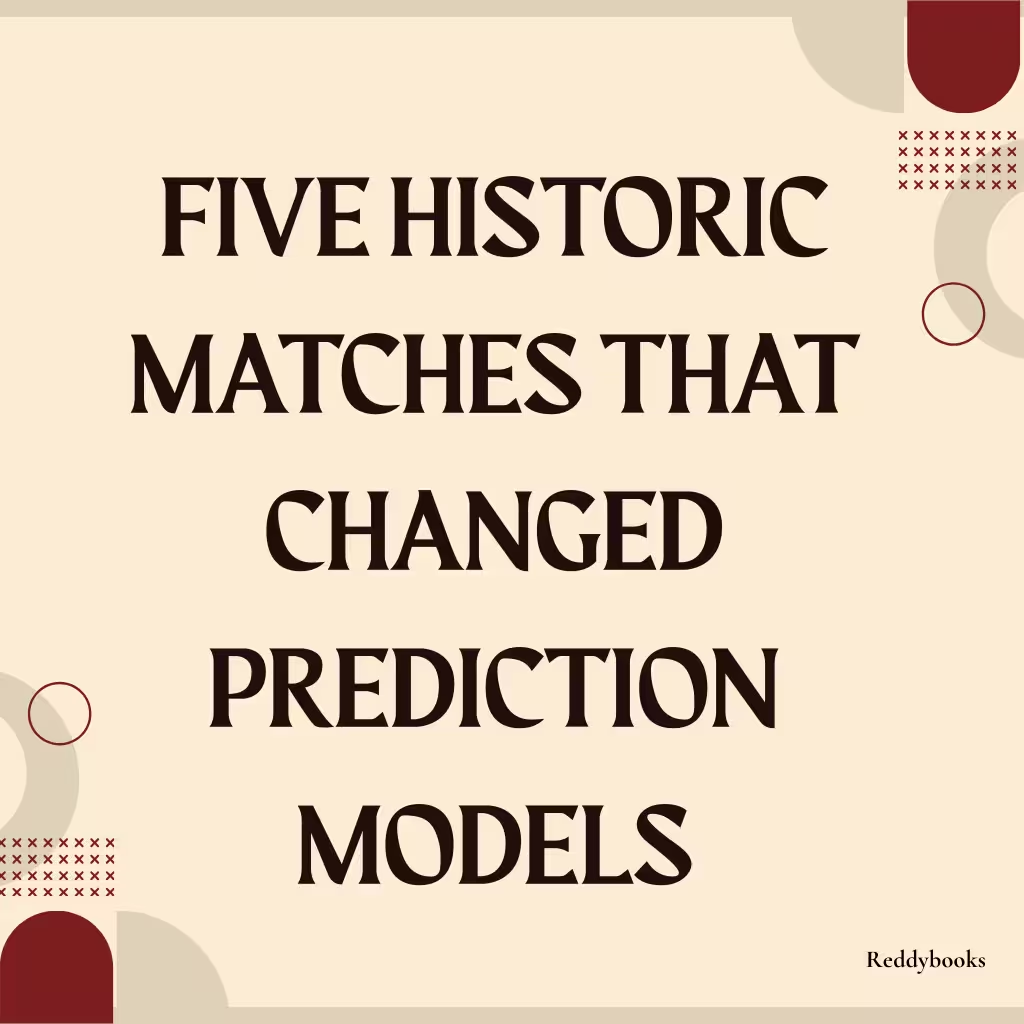Cricket has always been celebrated for its unpredictability. While statistics and analysis offer valuable insights, there are moments in history that redefine how predictions are made. These moments push experts to rethink assumptions, update models, and approach forecasting with a deeper perspective. That is why studying the Five Historic Matches That Changed Prediction Models helps fans and businesses understand the evolution of cricket analysis.
At Reddybooksonline, we connect the lessons of history with modern insights. Our platform ensures that fans see how iconic games reshaped forecasting and why expert-driven analysis provides a smarter way to follow cricket.
Why Historic Matches Matter in Prediction Models
Historic matches highlight the gap between what numbers suggest and what actually unfolds on the field. They remind us that predictions are not just about stats but also about psychology, momentum, and resilience. For analysts, these games create opportunities to refine models, ensuring future forecasts are sharper and more reliable.
Also Read – Top Metrics Decide T20 Matches
The Five Historic Matches That Changed Prediction Models
1. India vs West Indies 1983 World Cup Final
Few gave India a chance against the mighty West Indies. Yet Kapil Dev’s team produced one of the greatest upsets in cricket history. This match proved that models cannot ignore the mental strength of underdogs. It added weight to the role of belief and adaptability in forecasting outcomes.
2. South Africa vs Australia 1999 World Cup Semi-Final
The tied semi-final remains one of the most dramatic games ever. Forecasts had Australia slightly ahead, but pressure situations turned predictions on their head. Analysts realized that crunch scenarios require models that account for mental resilience, not just skills.
3. England vs India 2002 NatWest Series Final
Chasing 326, India’s young guns Yuvraj Singh and Mohammad Kaif stunned England with a fearless stand. Forecasts heavily favored England mid-match, yet momentum and confidence shifted the game. This historic chase reinforced the importance of momentum tracking in prediction models.
4. South Africa vs Australia 2006 Johannesburg ODI
The 438-run chase redefined what was considered possible in one-day cricket. Analysts had to rewrite models to recognize that no target is truly safe. It brought run-rate acceleration, batting depth, and chasing ability into sharper focus for predictions.
5. England vs New Zealand 2019 World Cup Final
A tied match followed by a Super Over, ending in a boundary countback rule, shocked the cricketing world. Forecasting models struggled with such rare outcomes. This game showed the need to build flexibility into models to account for extraordinary scenarios.
Lessons from the Five Matches
- Mental strength matters as much as numbers
- Momentum must be tracked in real time
- Prediction models need flexibility for rare outcomes
- Batting depth and chasing ability cannot be underestimated
- Historic upsets prove underdogs must always be factored in
By studying the Five Historic Matches That Changed Prediction Models, fans and businesses see how cricket analysis evolved into a smarter, more holistic process.
Also Read – Top Performances Changed Series Results
Why Businesses Should Pay Attention
Cricket audiences today expect more than simple scorecards. They want forecasts that explain why outcomes unfold the way they do. Businesses that highlight lessons from the Five Historic Matches That Changed Prediction Models build credibility and trust with their audiences.
At Reddybooksonline, we design strategies that use history as a guide, ensuring that forecasts are accurate, engaging, and meaningful for fans.
Why Choose Reddybooksonline
- Expert-driven insights that combine history with modern analysis
- Fan-first content designed for Indian audiences but globally relevant
- Consistent updates across matches and tournaments
- Trusted platform that transforms cricket analysis into smarter engagement
With us, you gain more than updates. You gain a partner who understands the story behind every prediction.
Also Read – Analyzing Historic Ipl Rivalries
FAQs
What are the Five Historic Matches That Changed Prediction Models
They are iconic cricket matches that forced analysts to rethink forecasting methods, including India’s 1983 World Cup Final win and the 2019 World Cup Final.
Why do historic matches influence prediction models
Because they reveal gaps between statistical assumptions and actual performance, encouraging experts to refine analysis.
Can modern predictions avoid surprises completely
No. Predictions are more accurate now, but cricket’s charm lies in its unpredictability. Historic matches prove why flexibility in models is essential.
How does Reddybooksonline use lessons from historic matches
We analyze these iconic games to refine forecasts, ensuring fans and businesses receive smarter, more reliable insights.
Final Thoughts
The Five Historic Matches That Changed Prediction Models highlight the evolution of cricket forecasting. From underdog victories to dramatic ties, these games shaped how experts approach predictions today. At Reddybooks, we simplify these lessons, ensuring fans and organizations enjoy cricket with clarity, context, and smarter engagement.




